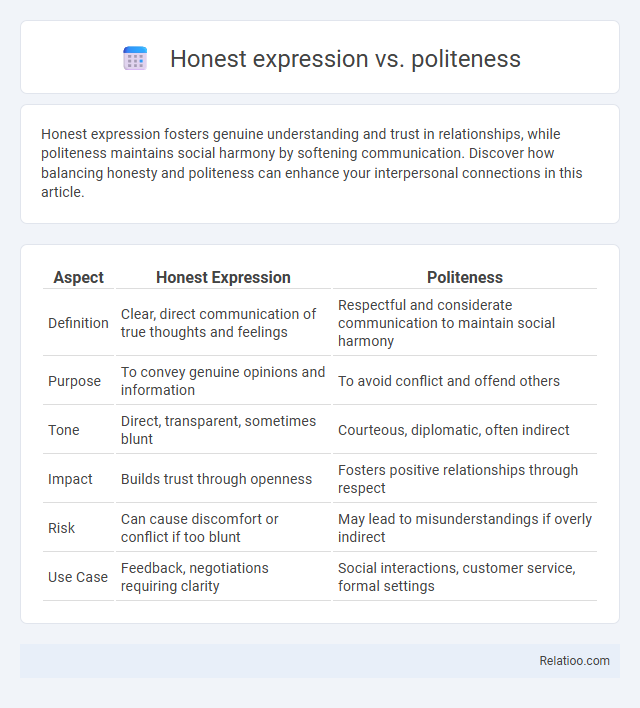Honest expression fosters genuine understanding and trust in relationships, while politeness maintains social harmony by softening communication. Discover how balancing honesty and politeness can enhance your interpersonal connections in this article.
Table of Comparison
| Aspect | Honest Expression | Politeness |
|---|---|---|
| Definition | Clear, direct communication of true thoughts and feelings | Respectful and considerate communication to maintain social harmony |
| Purpose | To convey genuine opinions and information | To avoid conflict and offend others |
| Tone | Direct, transparent, sometimes blunt | Courteous, diplomatic, often indirect |
| Impact | Builds trust through openness | Fosters positive relationships through respect |
| Risk | Can cause discomfort or conflict if too blunt | May lead to misunderstandings if overly indirect |
| Use Case | Feedback, negotiations requiring clarity | Social interactions, customer service, formal settings |
Understanding Honest Expression
Understanding honest expression involves conveying your true thoughts and feelings clearly and respectfully, ensuring authenticity without causing unnecessary offense. Politeness focuses on maintaining social harmony and showing consideration, which might sometimes soften or mask your honest opinions. Balancing honest expression with politeness helps you build trust and effective communication by being both sincere and respectful.
Defining Politeness in Communication
Politeness in communication involves expressing thoughts and feelings in a way that respects others' emotions and social norms while maintaining clarity and truthfulness. It balances honesty with tact, ensuring messages are conveyed without causing offense or misunderstanding. Understanding politeness requires recognizing its role in fostering positive interactions through considerate language choices and tone.
The Psychology Behind Speaking Honestly
Honest expression involves communicating your true feelings and thoughts without distortion, fostering genuine connections and self-awareness by reducing cognitive dissonance. Politeness serves as a social strategy to maintain harmony and avoid conflict by tempering honesty with tact and consideration for others' feelings. Balancing honest expression and politeness requires understanding psychological mechanisms such as empathy, emotional intelligence, and social norms that influence how Your message is perceived and received.
Social Expectations and Polite Behavior
Honest expression often challenges social expectations by prioritizing transparency over conventional politeness, which seeks to maintain harmony and avoid conflict. Polite behavior aligns with cultural norms designed to preserve relationships and social order by softening or withholding blunt truths. Balancing your honest expression with socially accepted politeness requires understanding the context and the potential impact on interpersonal dynamics.
Benefits of Honest Expression
Honest expression fosters authentic communication, building trust and deeper relationships by allowing Your true thoughts and feelings to surface. It reduces misunderstandings and promotes emotional well-being by encouraging openness and vulnerability. Honesty also enhances problem-solving, as candid feedback leads to clearer insights and more effective resolutions.
Potential Downsides of Excessive Politeness
Excessive politeness can lead to misunderstandings and hinder genuine communication by masking true feelings and opinions, creating barriers to honest expression. It often results in ambiguity, as individuals prioritize social harmony over clarity, which may obstruct problem-solving and trust-building. Prioritizing honest expression enables clearer, more authentic interactions, fostering transparency despite the risk of occasional discomfort.
Balancing Honesty and Politeness
Balancing honesty and politeness requires expressing your true thoughts clearly while maintaining respect for others' feelings. Politeness softens honest expressions, making feedback constructive without causing offense. You can foster open communication by choosing words thoughtfully, ensuring honesty uplifts rather than alienates.
Honest Expression in Different Cultures
Honest expression varies significantly across cultures, influenced by social norms and communication styles. In Western cultures, directness is often valued as a sign of honesty, whereas many Asian cultures prioritize harmony and may use indirect language to express honesty politely. Understanding these cultural nuances is essential for effective intercultural communication and maintaining respectful relationships.
Navigating Difficult Conversations
Navigating difficult conversations requires balancing honest expression with politeness to maintain respect and clarity. Honest expression ensures transparency and trust, while politeness preserves relationships by softening potential offense. Effective communication combines directness with empathy, allowing individuals to address issues without escalating conflict.
Strategies for Effective, Respectful Communication
Balancing honest expression with politeness requires strategies like active listening, using "I" statements, and focusing on specific behaviors rather than personal traits to ensure your message is clear and respectful. Employing empathy allows you to acknowledge the feelings of others while maintaining your truth, which fosters trust and minimizes misunderstandings. Your communication becomes more effective when you combine straightforward honesty with courteous language that respects diverse perspectives.

Infographic: Honest expression vs Politeness
 relatioo.com
relatioo.com